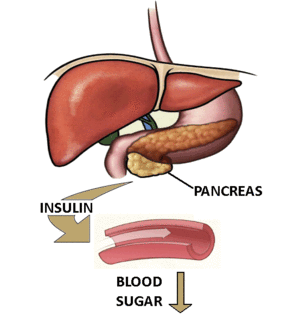Pycnogenol

Diagram shows insulin release from the Pancreas and how this lowers blood sugar leves. (Photo credit: Wikipedia)
Over the last couple of decades, the incidence of type II diabetes has increased dramatically worldwide. According to studies almost 18 million Americans live with type II diabetes and require a careful monitoring of the blood sugar levels, carbohydrate intake and regular physical exercise. Having type II diabetes means that your body is unable to make enough insulin or your body cells are unable to utilize them properly (insulin resistance). Normal insulin levels in the body help inmobilizingsugar (glucose) from blood in to the cells, where it is metabolized for energy.
However, with decreased insulin levels in the body or due to insulin resistance, sugar builds up in the blood. High amount of blood sugar can lead to complications (such as damage to nerves, blood vessels and organs). This can have damaging effects on heart, blood vessels of the eyes, kidneys, nerves, foot and immunity. The long term conventional treatment for diabetes is associated with other unwanted side effects. In many cases, is spite of medications, the disease becomes difficult to manage. Hence, many patients resort to complementary therapies to further reduce the risk of long term complications from this condition. According to studies, Pycnogenol has shown effective results in lowering blood sugar levels and reducing the risk of complications.
About Pycnogenol:
Pycnogenol is an extract from the bark of the French maritime pine tree. It is a natural health supplement that is extracted from the bark of Pinus maritima, European coastal pine. It is a flavonoid mixture or flavon-3 ol derivatives containing powerful blend of procyandins and phenolic acids present in Pinus maritima.
Role of Pycnogenol in Diabetes:
According to the study published in the October 2004 issue of “Life Sciences”, diabetic patients who took pycnogenol supplement along with their prescription medication for 12 weeks showed improved epithelial functioning of the blood vessels and lowered blood sugar levels as compared to the control group who were supplemented with placebo. Pycnogenol showed results in improving the efficiency of blood vessels allowing better exchange through the vessels wall.
Pycnogenol has been found to be effective in inhibiting the action of alpha-glucosidase, the intestinal enzyme involved in the digestion of complex carbohydrates like sugar and starch. Alpha-glucosidase is responsible for breaking the food carbs in to simple molecules to be absorbed by the blood. Pycnogenol has an inhibitory effect on alpha-glucosidase and hence uptake of glucose from a meal is delayed, which helps to prevent the sudden rise of glucose in the blood after meals. Pycnogenol has been found to be 190 times more potent that other prescription medication commonly used for treating type II diabetes, Precose.
This action of inhibiting alpha-glucosidase activity is due to the large procyanidin molecules present in Pycnogenol. They work as carbohydrate blocker and hence normalize the blood sugar levels. They allow the steady flow of glucose in the blood, which keeps you stay fuller for a longer time.
Studies have shown the beneficial effects of pycnogenol in lowering blood pressure and treating eye complications in diabetic patients.
Other Health Benefits of Pycnogenol:
Studies have shown the effectiveness of pycnogenol in:
1. Circulation problems: It helps in reducing leg cramps caused by poor circulation of blood.
2. Allergies and asthma: Studies have shown the beneficial effects of pycnogenol in reducing allergy symptoms.
3. Improved stamina: It boosts up your energy levels and enhances your endurance.
4. Inflammation: Pycnogenol contains anti-oxidants that help in fighting free radicals, which are the major cause of inflammatory diseases.
Related articles
- New Type 2 Diabetes Drug Helps Lower Blood Sugar: Study (news.health.com)
